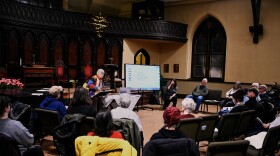There’s a debate brewing in Connecticut over a controversial statue of a colonial leader at the capitol building in Hartford.
Major John Mason lived in the 1600s. He was the deputy governor of the Connecticut colony and the founder of Norwich. He also led colonists and indigenous allies in a violent raid on a Pequot village, killing hundreds.
Rodney Butler, the chair of the Mashantucket Pequot tribe, called on the state to remove Mason’s statue at a recent public hearing.
“The question for us here in the year 2021 is whether a man who burned alive over 500 men, women and children, systematically hunted and slaughtered any remaining members of the tribe and attempted to eradicate an entire cultural identity, language and heritage, deserves a place of distinction on the space of Connecticut’s state Capitol,” he said.
State historian Walter Woodward said the raid was part of a complex war that needs nuance to understand. He said the Pequot were subjugating other indigenous tribes and attacking English settlements.
“Other tribes feared them, and chafed under their aggression. Both the Mohegans and Narragansetts made the decision to ally with the English," Woodward said. “Now, I offer this not to excuse the horrific violence that followed, but to highlight the fact that a simple narrative does not adequately capture this story.”
Woodward called for Mason’s statue to stay up, but he said the state could add new statues of indigenous leaders to tell the full story.
A state commission plans to make a recommendation next month on whether or not to take down the statue.
Copyright 2021 WSHU. To see more, visit WSHU. 9(MDExNDI3NjUzMDEzNjkzMTgzNTExNDFlYQ004))



